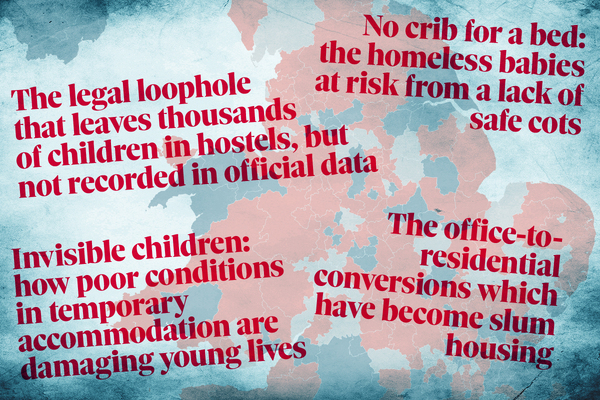The chief executive who has experienced the sharp end of the housing crisis
Sarah Ireland has just taken on the top job at Accent on an interim basis. Jenny Messenger finds out about her plans and how her experience in temporary accommodation informs her thinking today. Photography by Fabio De Paola
“The beds were made out of polished concrete. There were plastic mattresses and those horrible scratchy blankets,” recalls Sarah Ireland. “There were Pyrex dishes on the table, with singly packed Weetabix and UHT milk. But, actually, that felt like a safe place.”
Ms Ireland, the recently appointed interim chief executive of Accent, is talking about something few heads of housing associations have experienced first-hand: being homeless and having to live in temporary accommodation.
Ms Ireland has been promoted to the top job from within Accent, after Paul Dolan left to head up Riverside. She built her reputation at Accent by transforming its development team. But how has her experience of living in temporary accommodation shaped her career? And how has it shaped her approach to tenants, development and regeneration?
Before getting into the housing sector, Ms Ireland had a stint in accountancy. “I didn’t really know what I wanted to do, but I ended up working in accountancy,” she says, adding that she “didn’t really enjoy it”.
Although the built environment held far more appeal, Ms Ireland almost missed out on her chance to enter the sector. She started her building surveying degree in 1994, when her youngest child was a year old, but after encountering tough financial and emotional circumstances, thought she might have to drop out.
Talking to customers
Ms Ireland was in the second year of her degree at the University of Greenwich when she and her three children were forced to move into temporary accommodation. This experience “was the thing that made me succeed, I think. I was really, really lucky, because I spoke to my course tutor and said, ‘I’m going to have to leave and go back to accountancy,’” she says, but she received help instead.
“They signposted me to get free school meals and school uniform vouchers, they gave me a bursary, and they gave me a subsidised nursery place for my youngest daughter, and I finished my degree.
“I felt a bit like a phoenix coming out of the flames. I had this huge instinct to look after my children, and that roof over your head became a really important part of it,” she adds.
The course included projects on affordable housing, which encouraged Ms Ireland’s interest in the sector. She studied the regeneration of high-rise blocks, writing her dissertation on the technical and social failure of such accommodation.
“I looked at that from a customer perspective. People loved living in those places, and that was home for them. Just because there are building defects, or there are things wrong with it, or there might be social problems, that’s still very much someone’s home,”
Ms Ireland says.
From that point, the sector had her hooked. “It just became, ‘That’s what I’m going to do now. I’m going to work in housing.’”
After finishing her degree, Ms Ireland and her family were able to move out of temporary accommodation.
“I only had to live on that low income for a short period. I literally wore out all of my shoes and we had about £40 a week to live on,” she says. “But that’s stayed with me through my career.”
Ms Ireland’s first job in the sector was delivering planned works on housing stock for Mid Bedfordshire Council. Since then, she has taken on a series of roles in development, strategy and growth, including positions at Bedford-based BPHA and most recently at Accent.
She joined Accent in 2018 as executive director of development and growth, and was then appointed to head up its overarching strategy in 2023.
Speaking to Inside Housing over Teams, Ms Ireland has a clear sense of care, and respect for the fact that no matter how dilapidated a building may be, it remains home for those who live there.
This has endured in her approach to regeneration projects at Accent, many of which require different tactics, depending on where they are in the country.
Currently, the 20,700-home housing association has properties across the North, East and South of England, spread out in areas as geographically distinct as Bradford, Peterborough and Surrey Heath.
Accent over the years
Formed in 1966 as Bradford and Northern Urban Housing Association, the organisation rebranded as Accent Group in 2004. Two mergers followed: the first in 2005 with Nene Housing Society and the next in 2006 with Peerless Housing Group, before the landlord consolidated as Accent Housing in 2016.
But in 2009, the Tenant Services Authority revealed the housing association had made a loss of £9.8m in 2007-08 and had been in deficit for three years running.
Since then, the housing association has turned things around. Its most recent financial viability rating from the Regulator of Social Housing was V1, and it has also held on to its G1 rating for governance.
In March 2021, it emerged that PA Housing and Accent were contemplating a merger that would have created a 43,000-home landlord, but in May they announced the plans had been abandoned.
In 2022-23, Accent missed its target of delivering 314 homes by 93 units “due to delays with utility connections” on some of its land-led sites. However, Accent says its development team has just concluded a “bumper year”, with the highest number of completions for 10 years, 210 more homes delivered than last year and new family homes provided for 1,664 people.
Accent says it will invest around £130m on new homes in 2024-25, and plans to build 3,600 homes by 2031.
Tenants respond differently to refurbishment, she says. “Everyone has different sensitivities and different stories and different feelings about what’s going to happen, so sometimes you do have to recognise those families who need more help.”
Ms Ireland recalls learning this lesson early on when looking at a concrete block of maisonettes in Bedfordshire. “We had crumbling, cantilevered balconies that residents hadn’t been able to use for a long time,” Ms Ireland says.
It was her first project, she says, and notes a level of naivety in how she thought the demolition and rebuilding of homes some people had been living in for decades would be received.
“People were devastated. I really got to realise that importance of home – that familiarity, and all those memories,” she says.
On the other hand, Ms Ireland mentions the Ripleyville Estate in Bradford, which turned out very differently.
Built in 1976, the site was modelled on the Radburn Estate in the US state of New Jersey. Designed in the late 1920s to keep pedestrians and cars separate as the ‘motor age’ dawned, Radburn’s front doors opened onto common pedestrian space, while backyards faced the road. The model has now been discredited for isolating communities and encouraging crime through a layout that confuses public and private space.
In Bradford, consultation with residents revealed the majority were in favour of knocking down the 164 homes because of poor conditions and prevalent anti-social behaviour.
“It’s about talking to customers and finding out what they really need and what their aspirations are,” she says.
Development goals
In her own words, Ms Ireland is “a development person”, having spearheaded the beefing up of Accent’s development team in her previous role. After the global financial crisis of 2008, it had been limited to Section 106 purchases.
“I had to start everything from scratch and build a team, build networks, to say, ‘We’re here, we want to build homes.’ It was really exciting.
“I wrote a strategy, first of all, and it was about making a commitment,” she says, emphasising the work she and her team have done to build relationships with landowners and contractors.
Now, the plan is further stock consolidation. “If you look at our profile of stock, it’s quite scattered over the country, but with hubs in Surrey, Peterborough and Bradford. We’re working on consolidating stock across the Milton Keynes and Cambridge area.”
The housing association is in the same position as its peers: waiting to hear what the next round of Homes England grant funding will look like.
“Basically, if you haven’t got stuff in your pipeline very shortly now, for a start on site by March 2026, you’re not going to be able to deliver. But we’re progressing. We’re working on our pipeline on the basis that we will have grant in the future. We intend to carry on developing at the same rate as we are at the moment,” Ms Ireland says.
Over the next few months, Accent will focus on its new corporate strategy and 10-year investment plan, which Ms Ireland says is “one of the key things” of her tenure.
“We have additional rental income coming in from new stock. We’ve increased our planned spend dramatically. Last year, we spent just over £24m on our planned programme,” she says.
“We’ve identified some other sites that we think will be difficult to bring up to modern standards, so we’ll be working with customers on those in the future.”
Accent will also return to the capital markets after its first foray in 2019, when it issued £350m of bonds.
“We’ve got a revolving credit facility to tide us over. We will be looking to secure a significant amount of future funding for our forward programme, and that’s something that we’re actively looking at,” she says.
This is another reason why development is vital, she says. Over 90% of Accent’s homes are let at social rent, with hardly any properties at affordable rent.
“That’s a very different income profile to other housing associations. We couldn’t borrow £350m and spend it all on our existing homes, because we wouldn’t have any more income to pay that money back,” Ms Ireland notes.
She adds that the landlord hasn’t been hit with vast building safety costs because it has few high-rise blocks. “Two blocks in the South are medium rise, and everything else is pretty much two, three storey – even the flats we have. That is a very helpful dimension to our overall strategy.”
Accent is undergoing some internal changes, too, having closed its head office in Shipley, Yorkshire, to instead concentrate employees in two regional offices, one in Bradford and one in Peterborough.
It has also hired a chief information officer, who will be tasked with transforming the landlord’s IT processes and streamlining the way tenants can get in touch.
“We’ve started our process of mapping our customer journey. We’re really aware of all the touch points and pain points in that relationship.
“I like to look at complaints to learn from them,” she adds. “They’re all little nuggets of feedback.”
Ms Ireland’s lived experience continues to influence the way she approaches her work. “It’s about that insight, I suppose,” she says.
Recent longform articles by Jenny Messenger
Waqar Ahmed: the sector-disruptor who has helped L&Q grow
After more than three decades in housing, the ambitious finance director who drove some of the sector’s biggest mergers is retiring. He tells Jenny Messenger about his long list of financial firsts
Inside Housing visits one of the first landlords to win a C1 rating
Salford-based Salix Homes managed to get a top consumer rating from the English regulator despite facing significant challenges, including 20 high-rise buildings and mounting reports of repairs. Jenny Messenger visits to find out how Salix achieved its C1 grade
What is really happening with Section 106?
As developers raise the alarm about fewer social landlords buying Section 106 properties, Inside Housing’s exclusive data reveals how much affordable housing is delivered this way – and how much is in the pipeline. Jenny Messenger reports
In detail: what the NPPF changes mean for housing delivery
With the redrafted National Planning Policy Framework out for an eight-week consultation, James Riding and Jenny Messenger analyse the implications of a document that seeks to encourage large-scale housebuilding and reverse many of the previous government’s policies
Sign up to our Best of In-Depth newsletter
We have recently relaunched our weekly Long Read newsletter as Best of In-Depth. The idea is to bring you a shorter selection of the very best analysis and comment we are publishing each week.
Already have an account? Click here to manage your newsletters.













